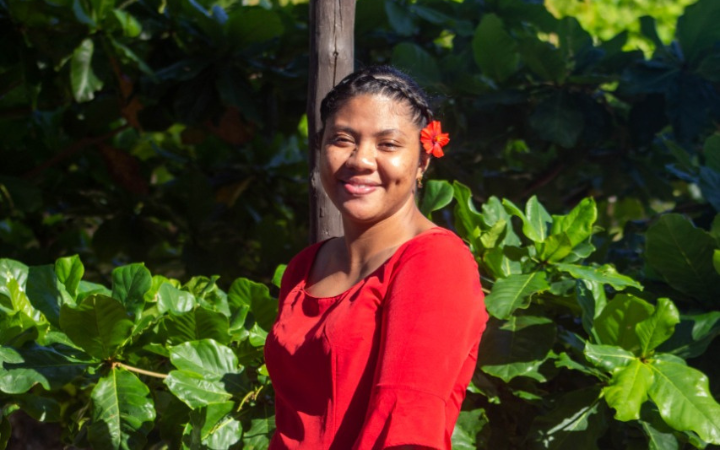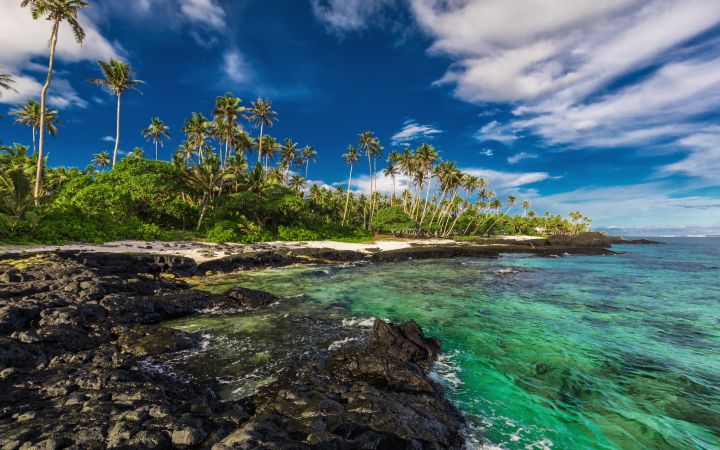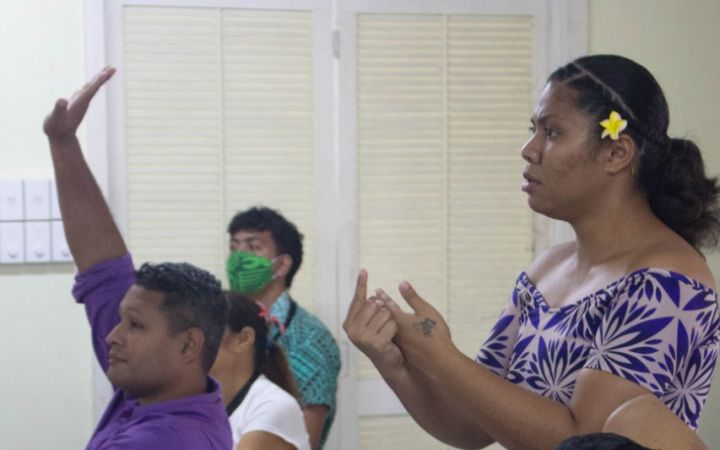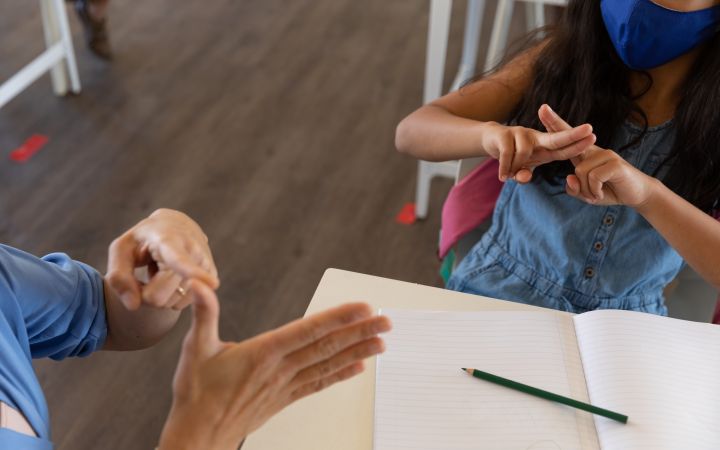- Maselina Iuta is a founding member and project officer for the Deaf Association of Samoa.
- Maselina aims to promote an inclusive approach to disaster risk reduction especially for those with disabilities in her country.
- Support from families and government is crucial to the overall response of the community when calamities arise.
- Maselina was helped by Annika Tierney Lemisio, disaster preparedness and response coordinator for the National Disabled Person’s Organisation, during the DRR training programme.
- UNITAR Division for Prosperity aims to empower women professionals from small island developing states to help their countries and communities better prevent, prepare, confront, and recover from disasters.
August 2022, Hiroshima, Japan – Empowering any people who are marginalized in society is no easy task and that is true for the deaf community in Samoa. Maselina Iuta, founding member and project officer for the Deaf Association of Samoa, joined the UNITAR disaster risk reduction programme in her drive to promote representation and inclusion of the deaf community in her country.
Maselina, herself deaf, knows first-hand how challenging everyday life can be – especially when disasters strike. She sees an urgent need to include persons with hearing disabilities in disaster risk reduction.
“Already, it’s extremely difficult dealing with disasters – and for persons with disabilities, even more so.”
Realizing the stakes
Located about halfway between New Zealand and Hawaii in the South Pacific Ocean, Samoa is hit each year by cyclones between November and April and is susceptible to earthquakes and tsunamis. As with many small island states in the region, the climate crisis is making matters worse.
In 2021, Maselina joined the UNITAR Tsunami-based Disaster Risk Reduction (DRR) Programme. The programme, supported by the Government of Japan, trains women professionals from small island developing states on leadership in disaster risk reduction. Nearly 200 women from the Pacific and Indian Ocean countries have been trained to date and are using what they learned to help their country better prepare for and manage disasters.
The UNITAR programme opened Maselina’s eyes to climate change. Climate change and disasters threaten Samoa’s marine environment, which supports many rural Samoans who depend heavily on fishing for their sustenance and livelihoods. Climate change also threatens the Samoan economy, which is centred on fishing and agriculture. Learning about disasters, their impact, and how people respond to them was a new world for Maselina.
Pursuing accessibility for all
What Maselina hears others tell persons with disabilities is disheartening at best and often demeaning or belittling. “I can think [of so many reasons why] people with disabilities need to know about climate change. Yet so many say to us: ‘Just sit over there. Stay out of the way.’”
But Maselina did just the opposite. Driven by her passion to advocate for those with disabilities, she joined the UNITAR DRR programme to support her community and get the deaf community represented. Hailing from Sataoa, a remote and small village with less than 2,000 inhabitants, making sure persons with disabilities in rural areas are protected during emergencies is especially close to Maselina’s heart.
Her vision of inclusive DRR includes accessible communication for all, including the wider availability of sign language interpretation. Sign language interpreters are rarely seen on national television in Samoa. During the COVID-19 pandemic, for example, although persons with hearing impairments could see on television that there were many deaths, they could not understand what was unfolding. In her work with the Deaf Association of Samoa, Maselina advocates for accessible government communications so people with hearing impairments could be better informed and protect themselves.
Further, Maselina believes that every person with a hearing disability should be able to choose their own interpreter. During the UNITAR DRR programme, Maselina was helped by Annika Tierney Lemisio, disaster preparedness and response coordinator for the National Disabled Person’s Organisation (Nuanua O Le Alofa), who had first introduced Maselina to the UNITAR programme. Beyond interpretation skills, Maselina explained, trust must also exist between the deaf person and their interpreter.
However, sign language interpretation is only part of the solution. Maselina estimates that in Samoa, only half of people with hearing impairments understand sign language – and even that is high compared to literacy levels in the deaf community. Samoans with disabilities are five times less likely to have attended school [link to PDF] than those without. Many rely on gestures to communicate. How could disaster risk reduction effectively include this community?
Inclusivity starts in the family
Maselina believes that inclusive DRR needs intensive support from both the family and government. Families play a crucial role in making sure that persons with disabilities properly understand the situation (like COVID-19) and are included in family contingency plans.
A few years ago, Maselina awoke to the sight of trees blown over and damage from the storm in her village – it was the aftermath of Cyclone Gita. Though overall damage [link to PDF] to Samoa was relatively slight, Maselina knows she was lucky. She lived in a house that could withstand the cyclone. And she had supportive parents who made sure that she was both unharmed and aware of what was going on.
When early warning systems do not cater to persons with hearing impairments, their families are often their only source of support and information. But many families do not communicate with their deaf family members, unaware that inclusive communication could mean the difference between life and death. Inclusivity, then, must start in the family.
Encouraging diversity in society
Governments too play a crucial role, such as by ensuring the presence of sign language interpreters on national television and providing computer screen readers. Looking at the examples from Japan in the UNITAR programme, Maselina was amazed at how people with disabilities were supported – from inclusive evacuation routes to accessible communications – and notes that there is much for others to learn.
“We really need to encourage and empower. We need to support persons with disabilities. We can’t separate them [from the rest of society]. We’re all equal. To tackle disaster and climate change, we need to work together.”
Having represented the Pacific as a winner of the 2021 Commonwealth Youth Awards, Maselina is far from resting on her laurels. She encourages anyone considering joining the UNITAR DRR programme to take full advantage of the programme – a programme that strengthened her conviction of the need for inclusion, even taking it to new heights.
“We need to make sure that our community is everywhere. We need to have disability representatives involved in every discussion, so that their perspective is included as we plan for the future.”
2021 Project Completion Report
About UNITAR
UNITAR Division for Prosperity, with the support of the Government of Japan, helps women leaders from small island states strategize better to reduce disaster risks in their countries and communities.





